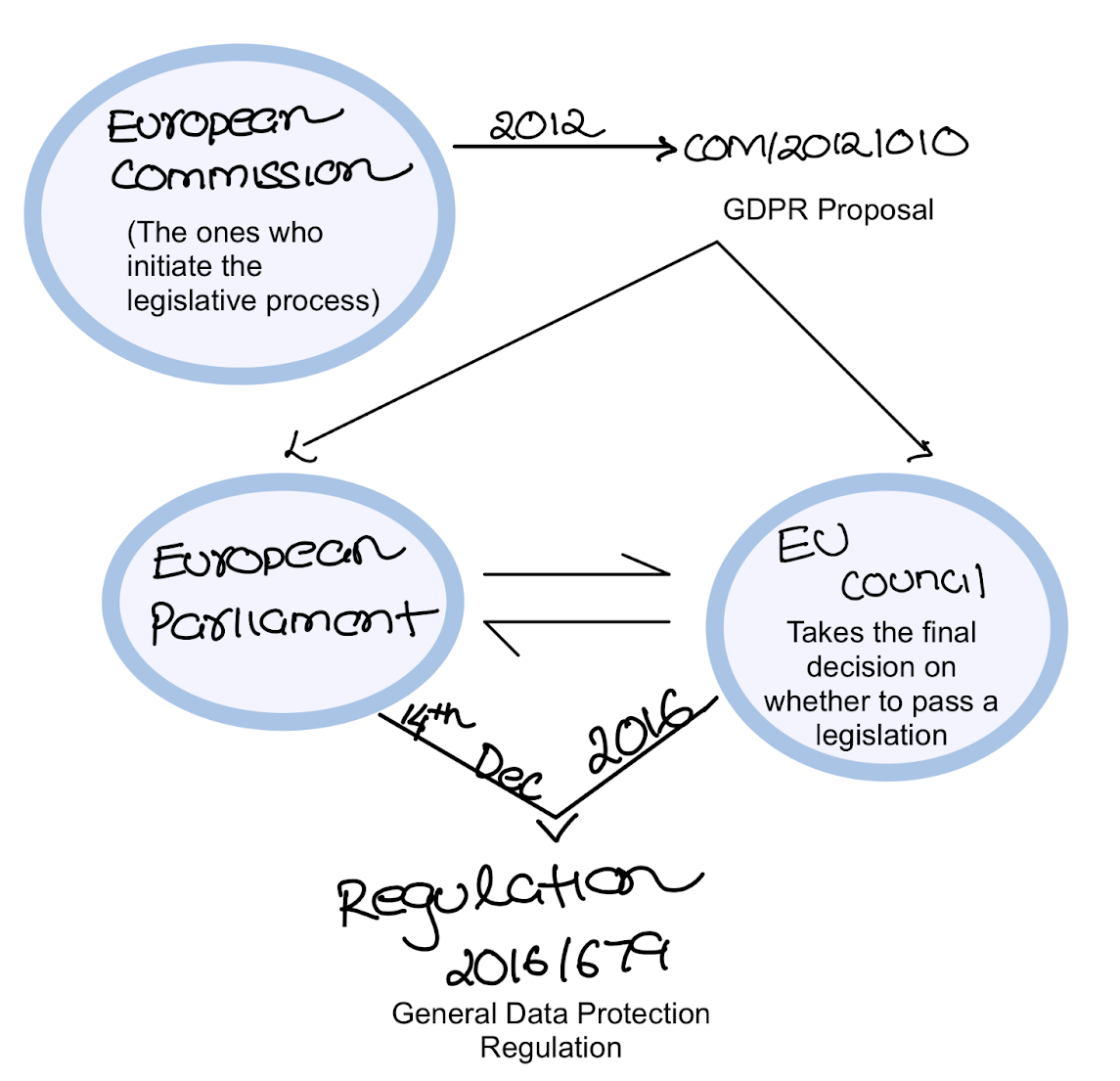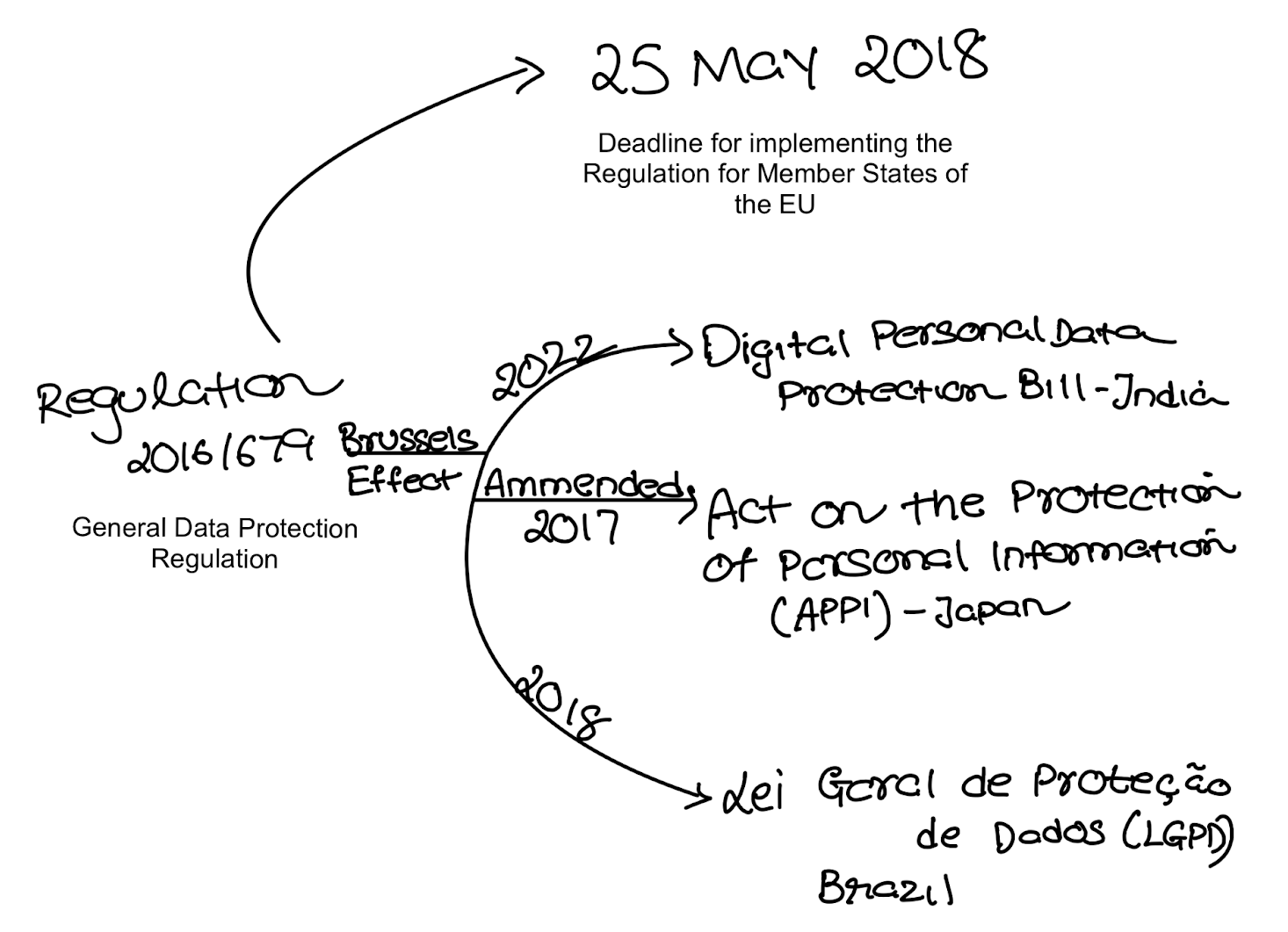This is written quickly; I'm mostly looking to gauge whether this topic is important at all. As such, I'd love to hear your thoughts!
Introduction
This post quickly looks at the 'Brussels Gap', i.e. the time elapsed between enacting a Regulation within the EU and its emulation in other parts of the world (i.e. the Brussels Effect).
The 'Brussels Gap' could be a relatively important phenomenon that is worth examining, given the development of a new Regulation on Artificial Intelligence proposed by the EU. If the Regulation comes to fruition (and it seems likely that it will), then having a better picture of the timescales at which the Brussels Effect operates seems crucial.
In this post, I outline a primer on the Brussels Effect and the relationship it could play with AI development. Then I list out different case studies of the Brussels Effect and look at the time differences between the enactment of a Regulation within the EU and its replication in other countries outside Europe.
Depending on your timelines for the development of Transformative AI, understanding the 'Brussels Gap' could be directly useful for weighing up the importance of the Brussels Effect.
If you're already up to speed with Brussels Effect, I'd suggest skipping to the section titled "The 'Brussels Gap'".
Background Information:
What is the Brussels Effect?
The "Brussels Effect" refers to the EU's unilateral ability to regulate the global marketplace[1]. This ability allows legislation and policy adopted by the EU to diffuse to other jurisdictions.
The General Data Protection Regulation (GDPR) is a salient example of this. The Regulation was passed by the European Parliament and the Council of the EU in 2016 and came into effect on the 25th of May, 2018.[2]

Introducing the GDPR led to a ripple effect; India, Japan, Brazil and elsewhere began emulating the Regulation.

Types of Brussels Effect
De Facto BE: This is where conduct under a particular area is done under the unilateral EU rules, even when other states continue to maintain their own rules. Anu Bradford describes this as the 'convergence' of a company's global production and conducts towards EU regulations.[3]
De Jure BE: Where states adopt EU regulations into their own legal body.
Why does the Brussels Effect happen?
Why do other countries choose to model after the EU? The two most substantial answers to this are (see Anu Bradford's [4] work for more):
1. Institutional Competence
The EU's architecture is incredibly complex. Here is an outline of how each body interacts with one another.

This complicated architecture has also had a 5.2% growth rate in all its bodies combined, with most of the staff being highly educated (usually possessing a master's degree).

Both of these factors resulted in a signal of competence to other countries in the world, which results in a higher degree of trust in the EU's decisions and policies.
2. Economic trade-offs
The EU consists of 27 Member States, creating strong economic incentives for companies to operate within the EU so they can trade within these states. Those who want to participate in this internal market must comply with the Union's Regulations. Essentially, no one gets to keep their cake and eat it too. If you're going to get hold of the gains of trading within the EU, you'll have to obey the rules of the EU.
In creating an EU-compliant product, companies have a choice: do they create separate products for different jurisdictions, or do they standardise their products across the world? The latter is usually more economically feasible, which unlocks the ability for the rules of the EU to spread.
What does the Brussels Effect have to do with AI?
The EU is likely to introduce the 'Artificial Intelligence Act'. You can read through the proposal for the Regulation in full here.
This act would be the first of its kind. There has yet to be another regulator that has created laws to govern the production of AI systems. Given this, it seems likely that the Brussels Effect will come into play. If it does, other countries will look at the final Regulation and model their legislation on AI after the EU AI Act.
The 'Brussels Gap'
Why does the Brussels Gap matter?
Suppose previous instances of the Brussels Gap are an indicator of how quickly countries/companies will move to emulate an EU Regulation. In that case, this should help us evaluate the importance of the Brussels Effect in regard to AI or any other area of relevance to the EA community.
Some instances of the de jure Brussels Effect have taken a while to occur. If one is concerned about the EU AI Act creating a worldwide AI governance regime, it could be a long wait before that materialises. However, if the primary focus of the BE is its occurrences in China, the United Kingdom and the United States, given their lopsided strength in AI capabilities research, then these concerns may be less warranted given their previous track record of relatively shorter Brussels Gaps.
While the United States is unlikely to implement national legislation on AI, specific states, like California with GDPR, could implement legislation that trickles into federal regulation via a de-facto channel. [5] If the Brussels Gap for California is short, then the Brussels Gap for the entire US could be short too.
Case Studies
The first two examples here will involve a de jure BE.
General Data Protection Regulation
Introduction of the Regulation: 2016
Country | Bill/Legislation (De Jure BE) | Year it was introduced | Brussels Gap |
California - USA | California Consumer Privacy Act | 2018 | 2 |
United Kingdom | Data Protection Act | 2018 | 2 |
India | Digital Personal Data Protection Bill | 2022 | 6 |
China | The China Personal Information Protection Law | 2020 | 4 |
Japan | Act on the Protection of Personal Information (Amended) | 2017 | 1 |
Brazil | Lei Geral de Proteção de Dados | 2018 | 2 |
Consumer Safety
Registration, Evaluation, Authorisation and Restriction of Chemicals (REACH) helped create a stark change to the manner in which chemical safety was regulated. It introduced the idea of 'no data, no market' (see Article 5 of the Directive). This flipped the burden of establishing the safety of chemicals onto manufacturers instead of the regulators.
Introduction of the Regulation: 2006
Country | Bill/Legislation (De Jure BE) | Year it was introduced | Brussels Gap |
United States | Toxic Substances Control Act (Amended) | 2016 | 10 |
South Korea | Act on Registration and Evaluation, etc., of Chemical Substances (K-REACH) | 2013 | 7 |
China | Measures for the Environmental Management Registration of New Chemical Substances | 2010 | 4 |
India | (Draft) Chemical (Management and Safety) Rules (I-REACH | ~2023 (last draft in September 2022) | 16 |
Hate Speech
We'll now look at an example of de facto BE.
In 2016, the European Commission introduced a 'Code of Conduct on Countering Illegal Hate Speech Online'. This was signed with Facebook, Twitter, Microsoft and Google. Signing this CoC required these companies to 'have rules and community standards that prohibit hate speech and put in place systems and teams to review content reported to violate these standards'. They would then have to 'review the majority of the content flagged within 24 hours and remove or disable access to hate speech content, if necessary'.
Further pressure was then applied in 2017 and 2018 by the EU, where they threatened to introduce additional sanctions and even legislation to replace the CoC. You can read more on the CoC here. [6]
Company | Date they sign on to the CoC | Brussels Gap |
Snapchat | 2018 | 2 |
TikTok | 2020 | 4 |
2021 | 5 |
- ^
- ^
Regulation (EU) 2016/679 of the European Parliament and of the Council of 27 April 2016 on the protection of natural persons with regard to the processing of personal data and on the free movement of such data, and repealing Directive 95/46/EC (General Data Protection Regulation)
- ^
- ^
- ^
- ^
A follow-up to the CoC - the Digital Services Act was introduced in October 2022.

Very cool, I didn't actually believe that other regulatory regimes emulated the EU, but I believe it a little bit now. The large number of GDPR emulations surprised me.
One thing I don't quite get
This is a growth in the number of staff?
Why does having more staff signal competence? Is it because more budget implies the agencies are being taken seriously?
Thanks for engaging with this post, Adrià!
Yup, it's the growth in staff.
I suspect it isn't the number of staff but rather how highly elite and educated the EU body is. Other countries seem to trust their decisions on this ground.